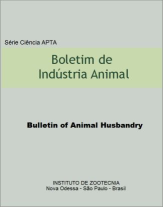Methane emission from sheep supplemented with macadamia oil cake
Palavras-chave:
GHG, macadamia, ruminantsResumo
Livestock production is an important source of GHG (greenhouse gases), with the agriculture sector being responsible for 7 to 18% of total GHG emissions. The addition of oil to ruminant diets has been used as a methane mitigation strategy. The metabolism of fatty acids in the rumen does not contribute to the growth of ruminal microbial protein, but there is synthesis and incorporation of these acids by the ruminal microbiota. Methanogenic bacteria are more sensitive to fatty acids, so the use of lipids in ruminant nutrition would have potential in Clean Development Mechanism (CDM) proposals, opening the possibility of using fat supplementation to obtain more efficient ruminal fermentation, with higher propionic acid production and consequent greater carbon retention. Macadamia oil cake is a source of highly degradable proteins and can be a source of energy for animal production, especially for ruminants. The objective of this work was to evaluate the effect of lipid supplementation with macadamia oil cake in relation to the emission of methane. Dorper x Santa Inês sheep with approximately 90 days of age were used (n=30). They were kept in individual stalls with a diet composed of 30% roughage (Cynodon sp.) and 70% concentrated feed. The animals were distributed in four treatments with different levels of macadamia oil cake supplementation in concentrate (0% inclusion in the control treatment, 6.5% in M1 treatment, 12% in M2 and 20% in M3). Measurement of methane was done in a respirometry chamber. The data were analyzed by the SAS PROC MIXED logistic model, with the means analyzed by the Tukey test at 5%. The daily CH4 emission (g) of the control group (19.047 ± 0.596) was greater than treatments M1 (13.017 ± 0.561), M2 (14.085 ± 0.693) and M3 (13.750 ± 0.542), with P=0.0001. The daily emission of methane was lower in groups that received lipid supplementation with macadamia oil cake compared to the control group (0%).
Downloads
Downloads
Publicado
Edição
Seção
Licença
Os autores não serão remunerados pela publicação de trabalhos, pois devem abrir mão de seus direitos autorais em favor deste periódico. Por outro lado, os autores ficam autorizados a publicar seus artigos, simultaneamente, em repositórios da instituição de sua origem, desde que citada a fonte da publicação original seja Boletim de Indústria Animal. A revista se reserva o direito de efetuar, nos originais, alterações de ordem normativa, ortográfica e gramatical, com vistas a manter o padrão culto da língua e a credibilidade do veículo. Respeitará, no entanto, o estilo de escrever dos autores. Alterações, correções ou sugestões de ordem conceitual serão encaminhadas aos autores, quando necessário. Nesses casos, os artigos, depois de adequados, deverão ser submetidos a nova apreciação. As opiniões emitidas pelos autores dos artigos são de sua exclusiva responsabilidade. Todo o conteúdo deste periódico, exceto onde está identificado, está licenciado sob a Licença Creative Commons Attribution (CC-BY-NC). A condição BY implica que os licenciados podem copiar, distribuir, exibir e executar a obra e fazer trabalhos derivados com base em que só se dão o autor ou licenciante os créditos na forma especificada por estes. A cláusula NC significa que os licenciados podem copiar, distribuir, exibir e executar a obra e fazer trabalhos derivados com base apenas para fins não comerciais.













